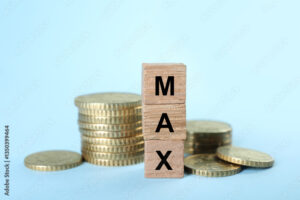I was recently asked by a Mindful Money Course member about compound interest. The question was: “How do I start generating compound interest?” In order to answer that question, I think it will help to delve a little deeper into the definition of compound interest.
Compound interest can make you rich.
Albert Einstein said that compound interest is the eighth wonder of the world. I agree, because compound interest can make you rich. It transforms the income from our hard work into a magical income-generating machine — a machine that, unlike our bodies, won’t wear out. The trick is that it takes another universal principle — time — to work.
Compound interest is the interest earned on both the principle deposit and the accrued interest.
Think about it this way: you create a small snowball in your hand (this is your original deposit) and you roll it down a steep hill. New snow accumulates on top of the original snowball so that by the time that it gets to the bottom of the hill, the snowball is much larger than when you started. The more momentum the ball gets, the faster it grows. You did nothing but create that original ball and put it in motion — the snowball did the rest. Now imagine that snowball as a ball of money.
The secret ingredient to compound interest is time — the more time the money can compound, the more it will grow. Like a snowball, the taller the hill, the longer (time) the snow has to accumulate before reaching bottom. In our metaphor, the ‘bottom of the hill’ is retirement.
Examples
Here are a few examples to demonstrate compound interest. I’ve already mentioned that I’m not a compound interest expert, so don’t hold me to the penny. Let’s take a look at Jill, Jack and Jeremy who are all 25 years old.
Jill
Instead of spending $15,000 on a wedding, Jill invests it at an interest rate of 8%. That $15,000 would be worth $320,000 when she retires at 65. (And she’s still married to a terrific guy.)
Jack
Jack chooses to spend $15,000 on his wedding and therefore postpones investing until he is 35. If Jack invests the same $15,000 at age 35 at the same 8% interest rate, his $15,000 will be worth $164,000 at age 65.
Jeremy
Jeremy thinks that, at 25, he is young and he should wait until he is older and making more money to invest. So, he waits until he is 45, when it suddenly dawns on him that he has very little put away for his retirement (which seems to feel pretty close these days). If Jeremy invests the same $15,000 at 8% at age 45, his investment will be worth only $73,000.
As you can see, the costs of delay are enormous! Jill, Jack and Jeremy all invested the same amount of $15,000, but Jill will retire with $156,000 more than Jack and $247,000 more than Jeremy.
Jill (again)
Now, let’s look at one more scenario. Let’s assume that Jill took her $15,000 and added only $250 per month to that original investment. She would be worth over $1,200,000 at 65!
The moral of the story is that almost anyone can become a millionaire because of the principle of compound interest. The sooner you get started the better.
Answering the Question!
Finally, let’s get around to answering the question, “How do I start generating compound interest?”
You start by investing.
There are three primary investment vehicles: stocks, bonds, and mutual funds. If you have a 401k, it’s likely you have money invested in all three. If you are self-employed or do not receive employer benefits like a 401k, you have to take investing into your own hands. That can be scary as there are many options. Not only is it possible to invest in the three mentioned, there are several alternative investing options, like real estate.
Since I am not a certified financial planner, I stay out of this conversation in that I do not have the credentials to advise you. But I do advise this: don’t schedule with a financial planner who takes a percentage of your portfolio. Better yet, schedule a meeting with our CFP, Whitney, at GoodLife Money. (Send an e-mail to support@wealthywellthy.life to get set up!)
Or join me on Wednesday for a Mindful Money webinar, where I will be teaching my personal money system, and talking about an upcoming opportunity for you to receive routine coaching from Whitney.





